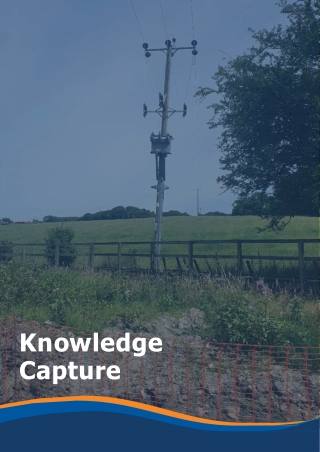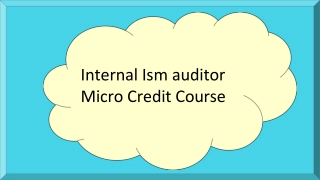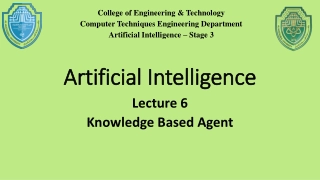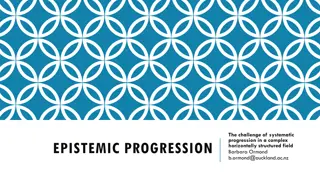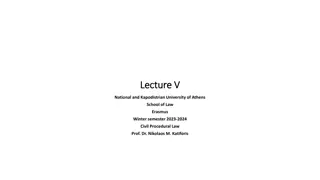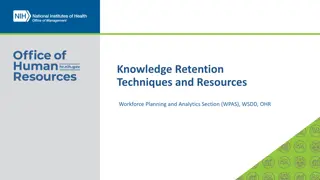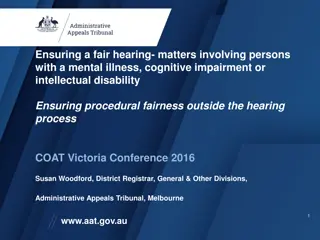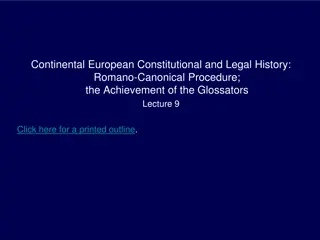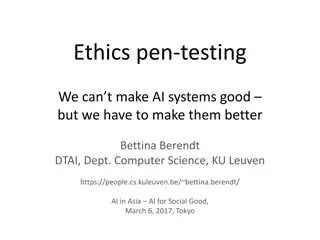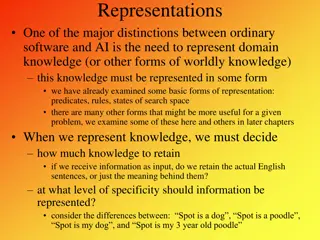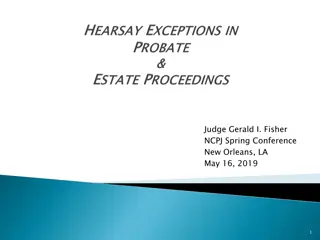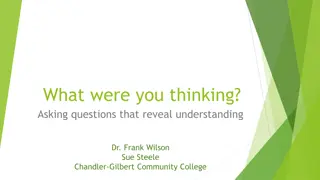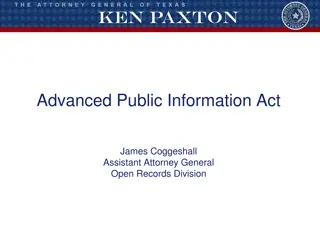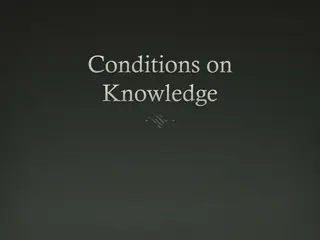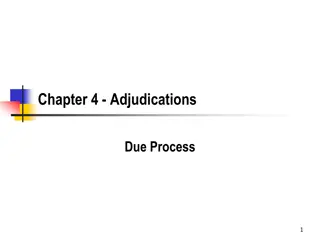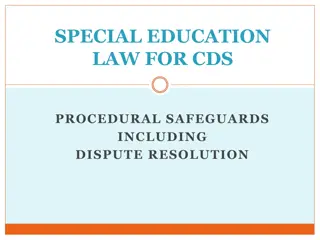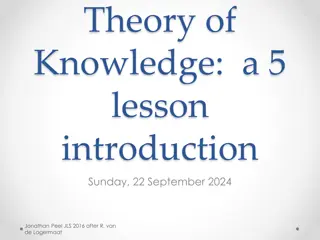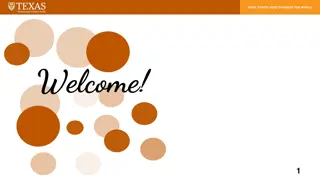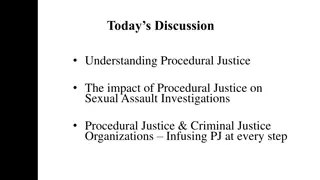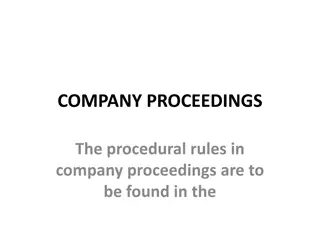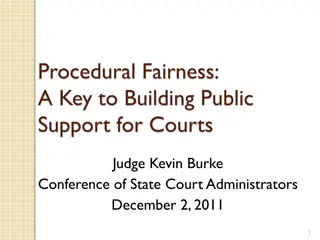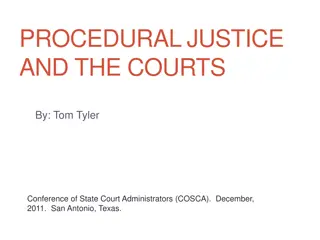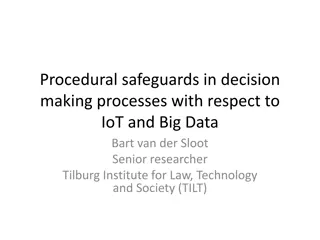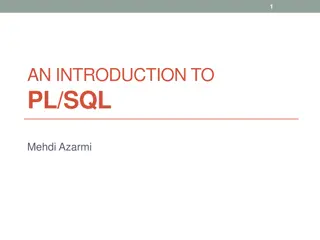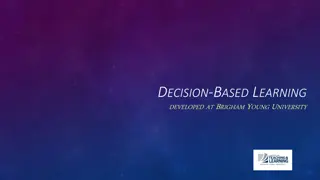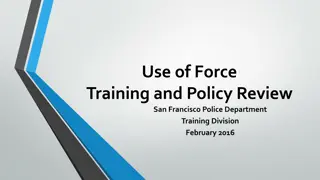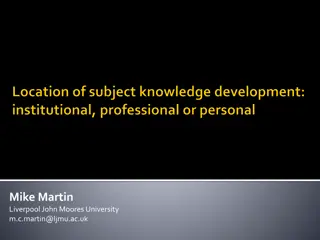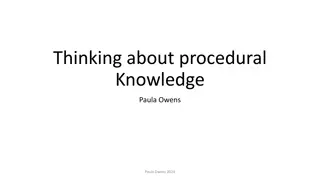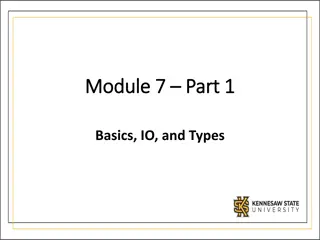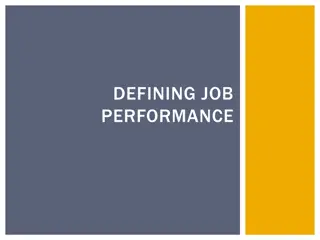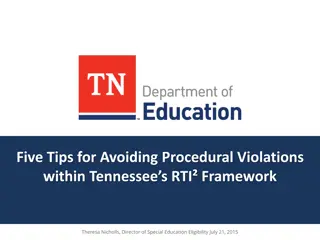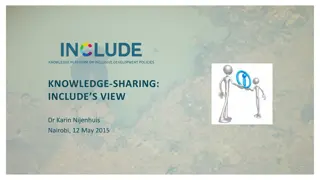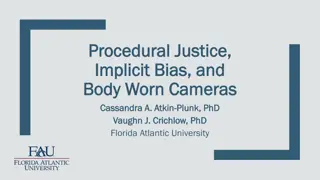Understanding Procedural Safeguards for Students with Disabilities
This information delves into the procedural safeguards for students with disabilities receiving special education services, covering topics such as laws governing procedural safeguards, parents' rights and responsibilities, abbreviation glossary, and the required Notice of Procedural Safeguards unde
1 views • 37 slides
Knowledge Capture
Knowledge capture is crucial for organizations to retain valuable expertise and prevent loss of critical knowledge due to employee turnover. Tacit and explicit knowledge play key roles, requiring strategic planning for retention, incentivizing knowledge-sharing culture, and implementing effective st
0 views • 6 slides
Exploring Product and Knowledge Graphs for Enhanced Information Retrieval
Dive into the world of product and knowledge graphs, uncovering the journey to a rich product graph, examples of knowledge graphs for songs, and the mission to provide comprehensive information on products and related knowledge. Discover use cases ranging from information provision to enhancing sear
3 views • 76 slides
Internal Ism auditor
Amidst the maritime industry's stringent safety regulations, the Internal ISM Auditor Micro Credit Course aims to equip participants with the necessary auditing skills to ensure compliance with the ISM Code. This course delves into the importance of internal audits for ship safety, emphasizing the s
0 views • 29 slides
Understanding Knowledge-Based Agents in Artificial Intelligence
Knowledge-Based Agents in AI utilize logic and knowledge representation to accept tasks, learn, and adapt to changing environments. Logic plays a crucial role in forming complex world representations and deriving actions based on inference. The central component is the Knowledge Base (KB), represent
3 views • 19 slides
Understanding Epistemic Progression in Learning: A Humanities Perspective
Exploring the concept of epistemic progression and its importance in education, this content delves into Basil Bernstein's theories on knowledge structure, trends in history education, and the role of procedural knowledge in fostering progression in disciplines like History.
1 views • 10 slides
Understanding Knowledge Management: Processes and Frameworks 2. In knowledge management, organizations create, share, and manage knowledge to enhance performance. It involves acquiring different types of knowledge through various means, such as perc
Knowledge Management, Organizational Objectives, Types of Knowledge, Tacit Knowledge, Explicit Knowledge
1 views • 17 slides
Proceedings for Provisional Remedies in Civil Procedural Law
Greek legal theory distinguishes between conservatory and regulatory provisional remedies to secure substantive rights or provisionally arrange disputed situations. These remedies are constitutionally guaranteed and granted under specific substantive and procedural conditions. The procedure involves
0 views • 14 slides
Effective Knowledge Retention Strategies in Workforce Planning and Analytics
Retaining knowledge is crucial for organizations to enhance customer service, foster innovation, improve efficiency, and bridge skill gaps. This article explores the significance of knowledge retention, the types of knowledge essential for succession planning, and two effective strategies - the Know
1 views • 10 slides
Ensuring Fair Hearing in Legal Proceedings for Individuals with Disabilities
Susan Woodford discusses the importance of procedural fairness in legal proceedings involving individuals with mental illness, cognitive impairment, or intellectual disability. She emphasizes the need for flexibility in adopting fair procedures tailored to each case, including providing information
0 views • 7 slides
Overview of EPPO and Procedural Rights in EU Law
This material focuses on the European Public Prosecutor's Office (EPPO) and its adherence to procedural rights within the framework of EU law. It covers the provisions of the EPPO Regulation related to procedural rights, including principles of rule of law, impartial investigations, and judicial rev
0 views • 22 slides
Evolution of Procedural Law in Continental European Legal History
The journey of procedural law in Continental European legal history, from the challenges faced by glossators in creating Romano-canonical procedure to the discussions on canonic procedure in canon law. Explore the intricacies of legal procedure development and the influences of historical texts such
0 views • 36 slides
Ethics Pen-Testing for AI Social Good
A proposal to use ethics pen-testing to enhance AI systems for social good. Addressing questions on defining social good, roles of knowledge, potential side-effects, and striving to improve. Exploring the concept of social good in terms of substantive and procedural aspects. Advocating for an advers
0 views • 19 slides
Understanding Knowledge Representation in Artificial Intelligence
In AI, representing domain knowledge is crucial and comes in various forms like predicates, rules, and search space states. Deciding the level of specificity and form of representation is key. Knowledge can be categorized into procedural, domain, and common sense knowledge, available in forms such a
2 views • 32 slides
Understanding Hearsay Rules and Exceptions in Legal Proceedings
Hearsay evidence, which is an out-of-court statement introduced for the truth of its content, is considered less reliable in court due to factors like lack of oath, inability to see demeanour of declarant, and absence of cross-examination. Various historical judgments and legal exceptions allow cert
0 views • 90 slides
Enhancing Student Understanding in College Algebra Assessments
Dr. Frank Wilson and Sue Steele from Chandler-Gilbert Community College discuss the issue of students memorizing procedures instead of actually understanding concepts in college algebra. They present a case study highlighting the importance of assessing conceptual mastery over procedural knowledge.
0 views • 31 slides
Open Records and Requests Process Overview
This presentation provides valuable information on the Advanced Public Information Act, open records letter rulings issued between 2001-2017, withdrawing requests for rulings, requesting previous determinations, and procedural obligations under Section 552.301. It covers reasons for withdrawal, comm
0 views • 35 slides
Exploring Epistemology: Understanding Knowledge and Truth
Epistemology delves into the nature of knowledge, understanding, wisdom, and justification, questioning the extent of human knowledge and the different kinds of knowledge. It explores skepticism and conditions on propositional knowledge, discussing whether knowledge implies truth and the debate betw
1 views • 54 slides
Exploring Due Process: Substantive and Procedural Dimensions
Dive into the intricacies of substantive and procedural due process, understanding the limits on government regulation and the significance of fair procedures in affecting individual rights. Explore the evolution of due process from historical perspectives to modern interpretations, reflecting on it
1 views • 27 slides
Navigating the World of Big Data, Knowledge, and Crowdsourcing
The world has evolved into a data-centric landscape where managing massive amounts of data requires the convergence of big data, big knowledge, and big crowd technologies. This transformation necessitates the utilization of domain knowledge, building knowledge bases, and integrating human input thro
1 views • 5 slides
Understanding Special Education Law and Procedural Safeguards for Children with Disabilities
Learn about the procedural safeguards that educational institutions must implement for children with disabilities, including the provision of annual notice, independent evaluations, parental consent, access to records, and dispute resolution options. Discover who these safeguards apply to – parent
0 views • 28 slides
Exploring the Nature of Knowledge in Theory of Knowledge
Delve into the essence of knowledge with Jonathan Peel's introduction to Theory of Knowledge, pondering on how different disciplines perceive knowledge, the impact of empirical questioning, and timeless wisdom on ignorance and progress. Explore the concept of basic knowledge and its implications, in
0 views • 37 slides
Procedural Decomposition and Static Methods in Programming
Understanding procedural decomposition and static methods is essential in programming to reduce redundancy, organize code effectively, and manage complexity. Procedural decomposition involves dividing a problem into methods, while static methods help in code reuse and managing complexity. By designi
0 views • 18 slides
Understanding Modelling Knowledge and Knowledge Representation
Explore the significance of modelling knowledge through knowledge representation, making it explicit, independent, and reusable. Learn why knowledge representation is essential and how it facilitates exchange, query, inference, and visualization. Delve into examples of knowledge application in vario
0 views • 30 slides
Understanding Procedural Justice and Its Impact on Criminal Justice Organizations
Procedural justice emphasizes fairness, respect, and transparency in decision-making processes. This approach can lead to positive organizational changes, improved community relationships, and increased trust and legitimacy. The four pillars of procedural justice include fairness in rule application
0 views • 12 slides
Understanding Procedural Rules in Company Proceedings
Procedural rules governing company proceedings can be found in the Companies Proceeding Rules, Companies Winding-Up Rules, and the Federal High Court (Civil Procedure) Rules. These rules dictate the process for applications, such as Originating Summons, Originating Motion, or Petition under CAMA. Th
0 views • 22 slides
Understanding Public Perceptions of Courts and Judges
Exploring public opinions on procedural fairness in courts, this content discusses the influence of judges' political views, aspirations for higher courts on their impartiality, and the divided nation on interpreting the Constitution. It also highlights the complexities of public knowledge about the
0 views • 24 slides
Understanding Procedural Justice and Public Trust in the Justice System
The discussion delves into the goals of the justice system, the importance of public trust and confidence, and the concept of legitimacy in the context of the courts. Despite improvements in the delivery of justice, trust and confidence among Americans, especially in minority groups, remain a challe
0 views • 39 slides
Procedural Safeguards in Decision-Making Processes with Respect to IoT and Big Data
Bart van der Sloot, a Senior Researcher at Tilburg Institute for Law, Technology, and Society, discusses procedural safeguards in decision-making processes related to IoT and Big Data. The overview includes topics such as access and use paradigms, decision-making in GDPR and ECHR, and the importance
0 views • 33 slides
Introduction to PL/SQL: Oracle's Procedural Language Extension
PL/SQL is Oracle's extension to SQL, combining the power of SQL with the procedural constructs of a 3GL. This introduction covers the basics of PL/SQL blocks, block structure, variables and types, executable sections, and example variable declarations. It also highlights the features such as error h
0 views • 29 slides
Exploring Decision-Based Learning and Knowledge Types
Decision-based Learning is an innovative approach where students learn through solving real-world problems and making interconnected decisions. This method helps in internalizing decision maps and understanding various types of knowledge like conceptual, procedural, and conditional. Conditional know
0 views • 26 slides
San Francisco Police Department Training Updates 2016
San Francisco Police Department implemented various training updates in 2016 including Use of Force Training and Policy Review, Changes in Firearms Training and Qualifications, Mandated Force Options Training, and Procedural Justice & Legitimacy Course. The updates aim to enhance officer training, e
0 views • 14 slides
Understanding Subject Knowledge Development in Education
Exploring the complexities of subject knowledge development in education, this study delves into areas such as students' existing knowledge, competencies, and the role of institutions in shaping knowledge acquisition. The focus lies on personalizing knowledge to individual needs rather than a fixed
1 views • 22 slides
Understanding Procedural Knowledge in Geography Education
Procedural knowledge in geography education involves developing geographical skills such as map reading, fieldwork, and enquiry. It focuses on how students gather, analyze, present, and interpret spatial information using tools like globes, atlases, and maps. This knowledge is essential for students
0 views • 4 slides
Understanding Python and Java Basics: Procedural vs. Object-Oriented, Interpreted vs. Compiled
Python and Java are both procedural and object-oriented languages. Python is an interpreted language, while Java is compiled. They differ in how code is processed, executed, and optimized. Learn about their syntax, interpreter vs. compiler, class structure, comments, and basic I/O operations.
0 views • 23 slides
Understanding Job Performance and its Determinants
Job performance encompasses what employees do and the results they achieve, often influenced by factors beyond their control. Productivity, evaluative nature, and multidimensional aspects characterize performance evaluation. Performance is determined by declarative knowledge, procedural knowledge, a
0 views • 14 slides
Avoiding Procedural Violations in Tennessee's RTI Framework
Gain valuable insights on avoiding procedural violations within Tennessee's Response to Intervention (RTI) framework through the guidance provided by Theresa Nicholls, Director of Special Education Eligibility. Learn about the risks associated with procedural violations, review pertinent case law, r
0 views • 29 slides
Knowledge Sharing and Inclusive Development Policies
Knowledge Platform on Inclusive Development Policies (INCLUDE) focuses on enhancing research utilization in policy-making to foster more inclusive development. It was established in 2012 with the aim of bridging the gap between research and policy processes in African countries. INCLUDE engages expe
0 views • 8 slides
Understanding Procedural Justice, Implicit Bias, and Body Worn Cameras
This content covers the concepts of procedural justice, implicit bias, and body-worn cameras in the context of law enforcement. It explores the importance of procedural justice, strategies for enhancing it, and its significance in policing, with a focus on fairness and legitimacy. The images provide
0 views • 38 slides
Proficient Clinical Examination and Procedural Skills in General Practice
Proficient Clinical Examination and Procedural Skills (CEPS) are essential for effective general practice. Trainees must gather evidence regularly and reflect on their progression with word descriptors. Requirements for CCT include 5 mandatory intimate examinations observed by a suitably trained pro
0 views • 10 slides

